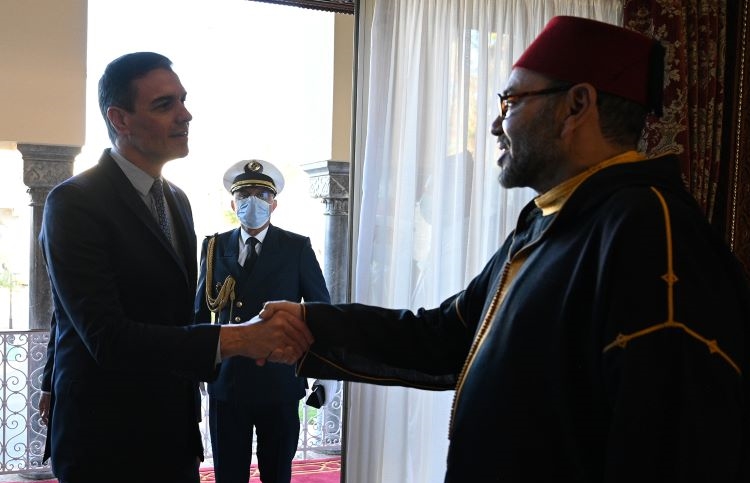Eduardo González
The Minister of Foreign Affairs, José Manuel Albares, assured yesterday in Brussels that a group of the Venezuelan opposition led by Gerardo Blyde, the coordinator of the Venezuelan opposition delegation in the negotiations with the regime of Nicolás Maduro in Mexico, has asked him for a meeting next Sunday in Madrid and that he, “of course”, has answered “immediately yes”.
This is what Albares told the press yesterday at the end of the meeting of the EU Foreign Affairs Council (FAC), held in Brussels and which included, at the request of the EU High Representative for Foreign Policy, Josep Borrell, an analysis of the situation in Venezuela after the decision of the National Assembly (controlled mostly by the opposition) to dismiss Juan Guaidó as ‘in charge’ president and the resumption, last November in Mexico, of negotiations between the opposition and the Government.
“I have said it many times and I said it when I met with the two representatives of Government and opposition who are currently leading the dialogue in Mexico: Spain is at the disposal of the Venezuelans for everything in which the Venezuelans consider that Spain can be useful to them, and they are the ones who must decide what is useful,” Albares told reporters in Brussels.
“For example, a Venezuelan opposition group headed by Gerardo Blyde has asked for a meeting with me on Sunday the 29th in Madrid and, of course, I immediately said yes,” he continued. “There is no formal request, things do not arise in that way”, because the format of dialogue in Venezuela is “very different from the one in Colombia, where Spain does formally have a statute”, but “Spain is at the disposal of that dialogue” and if the Venezuelans “consider that it is useful in something, they will find us there, we will spare no effort”, he continued. “Of course, we are pleased that there is dialogue and that there has been a first humanitarian agreement, and what we hope is that this will also lead to a political agreement,” he concluded.
In declarations to the press before the beginning of the Council, Albares assured that the Venezuelan government and opposition have asked Spain to “be present and accompany” the dialogue being held by both parties in Mexico for a democratic solution to the crisis. However, opposition sources later assured the Europa Press agency that this request is not true. The Minister did not comment on this denial in the subsequent meeting with journalists and insisted on his next meeting with the supporters of Blyde, president of the opposition coalition Mesa de la Unidad Democrática (MUD).
Ukraine
On the other hand, and with regard to the war in Ukraine, which absorbed a good part of the meeting in Brussels, Albares informed of the approval of a new disbursement of 500 million euros from the European Peace Fund, with which the purchase of arms for Kyiv has been financed since the beginning of the war and which, in this case, will be used for the training of the Ukrainian military in the Member States.
The minister also avoided pronouncing on the controversy generated by Germany’s refusal to grant its permission for the shipment to Kyiv of German-made Leopard battle tanks. “There has been no substantive discussion about sending those particular tanks, the discussion has been broader, about the best way to give Ukraine support,” he assured. In any case, he warned, “we have to make an effort to maintain unity”, because “airing alleged divisions when, at this moment, all Europeans are united in supporting Ukraine does not help Ukraine at all”. “What Spain wants is for there to be no issues that could be divisive,” he insisted.
As for the possibility of Spain joining Poland‘s proposal to send such tanks to Ukraine if so agreed within NATO and outside German authorization, Albares merely warned that “when we talk about military material we have to be very discreet, not only Spain but all Europeans, especially when we talk about tanks.” In any case, he assured, “this debate has not been raised by Poland or anyone else”.
Iran and bilateral meetings
During the Council meeting, a fourth round of sanctions against Iran was also approved, which are extended to another 18 individuals and 19 entities for their involvement in “the widespread and disproportionate use of force against non-violent demonstrators following the death of Mahsa Amini”, and the establishment of an European Union civilian mission in Armenia (EUMA) in the framework of the Common Security and Defense Policy (CSDP) to, among other objectives, generate “an environment conducive to EU-supported normalization efforts between Armenia and Azerbaijan”.
In the margins of the Foreign Affairs Council, José Manuel Albares held bilateral meetings yesterday with the Palestinian Prime Minister, Mohammad Shtayyeh (who also participated in a working lunch with the rest of European counterparts), to whom he reiterated “Spain’s support for the two-state solution, the basis for achieving peace in the region” and “solidarity with the Palestinian people, through aid from the Spanish Cooperation and UNRWA”. He also met with his Czech counterpart, Jan Lipavský; the new Irish Foreign Minister, Micheál Martin; the European Commissioner for Neighborhood and Enlargement, Oliver Varhelyi; and the Vice President of the European Commission and Commissioner for Interinstitutional Relations and Foresight, Maroš Šefčovič, to address, in this case, “EU-UK relations and the agreement on Gibraltar”.







